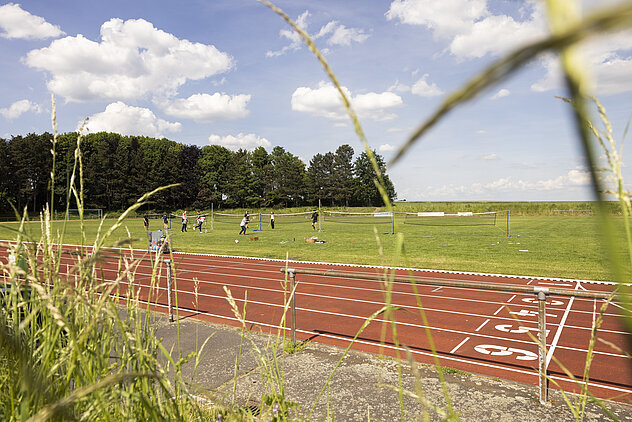Events
Application
Events
Application
At our bilingual Primary Schools in Frankfurt City and Steinbach im Taunus, your child will experience the joy of learning every day — in both German and English. We focus on building a strong academic foundation while helping children develop important values for life. Through our bilingual approach, they naturally strengthen their language skills, grow in intercultural understanding, and develop an open, global mindset.
Our dedicated teaching team guides your child through the school day with both care and expertise. Teachers consistently speak in their native language - German or English - creating a truly immersive and authentic bilingual environment. In most classes, additional staff support learning to meet each child’s individual needs.
Our campus is more than just a place of learning. It is a space for discovery, creativity and connection. Open from 7:30 am – 6 pm, it offers a vibrant environment where children grow academically and socially as part of a strong community.
We integrate team and project work into our curriculum to strengthen independence and self-confidence. In this way, your child learns to work autonomously while collaborating with others, an essential skill for life.
We combine hands-on learning with exploration of the local environment. Through real-world experiences and exciting discoveries, we nurture curiosity, creativity and a deeper understanding of the world.
From choir and instrumental lessons to art, writing, language clubs and a wide range of sports, our rich extracurricular offer complements the curriculum. Our vacation camps add even more variety and excitement during the school holidays.
Our classrooms feature the latest digital technology, including interactive whiteboards and laptops. A well-stocked library, fully equipped science labs and dedicated rooms for movement and relaxation ensure a well-rounded learning experience.
Children who experience bilingual education over several years benefit in ways that go beyond traditional foreign language teaching. Immersive bilingual learning not only strengthens their skills in both their native language and the new language but also boosts their overall academic performance. Experiencing bilingualism daily at school and in everyday activities enhances cognitive abilities, increases language sensitivity, fosters creativity, and encourages flexible thinking.
At our school, teachers use the immersive approach, teaching exclusively in their own native language—German or English. Through gestures, facial expressions, and visual aids, children naturally absorb language skills. This approach enables our pupils to confidently discuss topics, deliver presentations, and comfortably use specialized vocabulary in both languages throughout their primary school years.
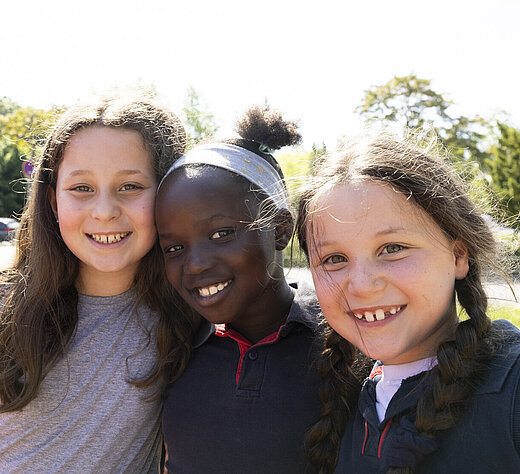
Appreciative pedagogy is a cornerstone of our positive learning culture. It is based on respect, empathy and recognising each child as an individual personality. Our teachers foster not only subject skills but also social and emotional abilities by creating a supportive and trusting environment.
Praise and encouragement play a vital role in building children’s self-confidence and motivation to learn. Mistakes are seen as opportunities to grow rather than failures. Active child participation, constructive feedback and respectful interaction all contribute to this approach. This creates a learning environment where children feel valued, taken seriously and supported, fostering a positive self-image and joy in learning.
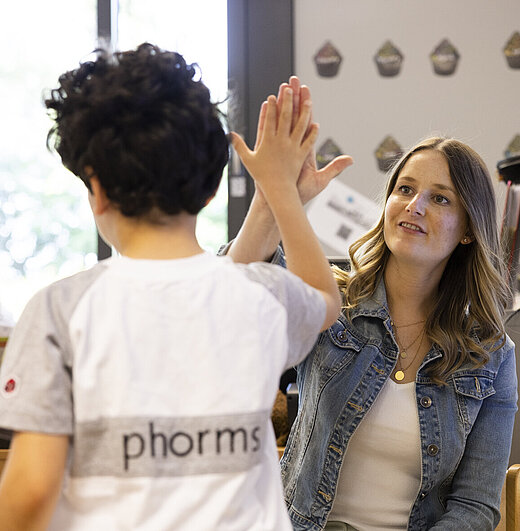
Every child brings their own interests and abilities. Thanks to a good child-to-teacher ratio, two educators per class, interdisciplinary teamwork, project-based learning, and creative teaching methods, there is space for children to freely develop their talents. When needed, we also provide targeted support in small groups through our Special Needs / Learning Support Programme, especially in English, German, and Mathematics.
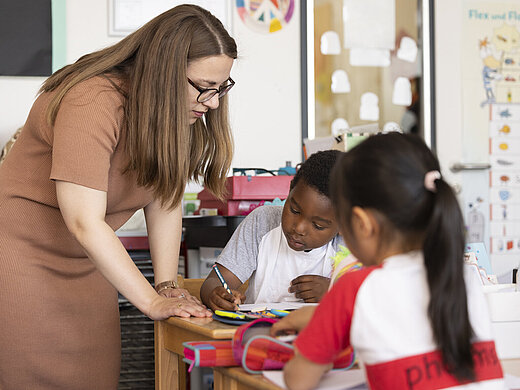
We value enabling children to learn independently and enrich lessons with engaging experiences. Therefore, teachers regularly include projects where children learn actively and practically. Activities may include excursions, theatre and museum visits, expert interviews, model building, experiments and group presentations. Through projects, children learn to explore topics independently, creatively and from various perspectives while developing social skills such as responsibility and cooperation.
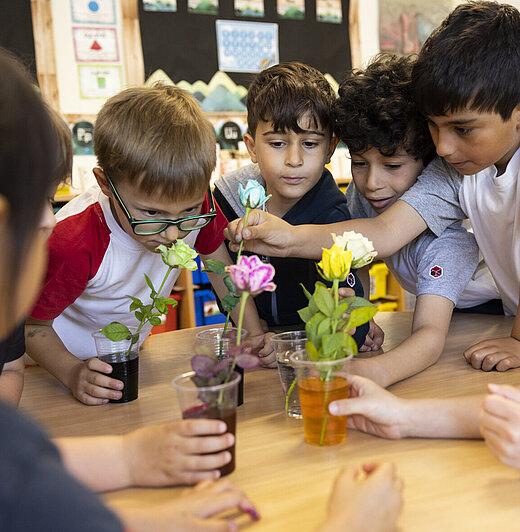
Our children’s scientific skills are encouraged from the start. By observing, measuring, classifying and analysing, they learn to understand natural phenomena and solve everyday problems playfully and creatively. This nurtures an early joy of logical thinking.
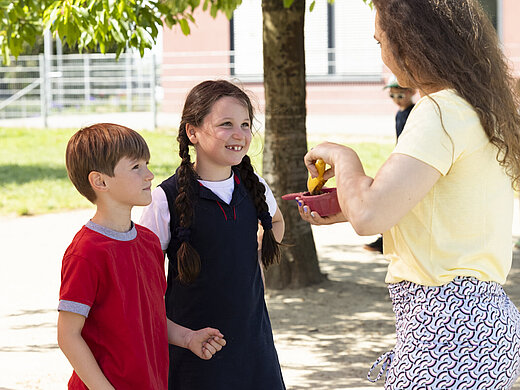
Our classrooms are equipped with interactive smartboards and every child has access to tablets and laptops. Children learn to research, write, calculate and create presentations digitally. This fosters their learning development and media literacy simultaneously. Special attention is given to safe and child-friendly internet use.
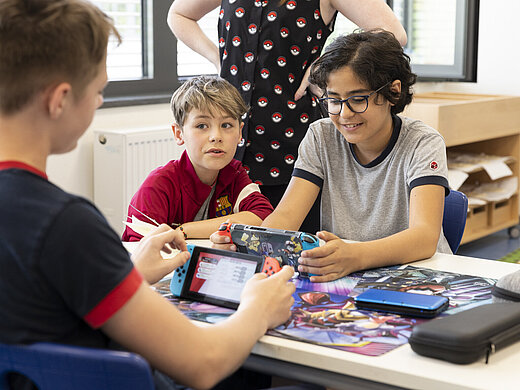
Creativity forms the basis of joyful learning. We prioritise music and arts education. Lessons are taught by trained specialists in well-equipped rooms that encourage trying out instruments. All children learn to read music and play instruments from early on. We offer diverse electives and after-school programs to support creative development. Children participate in concerts, art exhibitions and regularly visit theatres, concerts and museums.
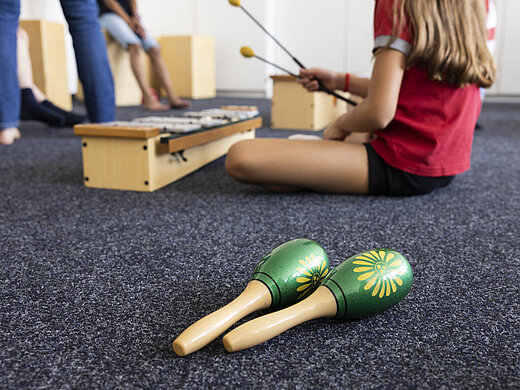
Physical activity plays a central role in everyday school life as it not only promotes physical fitness but also strengthens concentration and social interaction.
In physical education, children learn various forms of movement, team spirit and fair play in a playful way. In addition to classic sports such as athletics, gymnastics, dancing and ball games, swimming is often part of the curriculum in Year 3. Every year, with the support of parents, a large sports festival takes place where all year groups can showcase the skills they have learned.
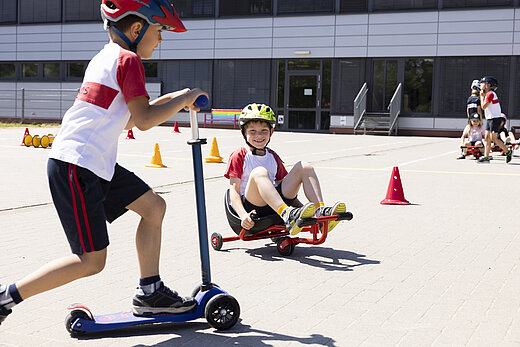
The Cambridge International Primary Program provides a comprehensive foundation for early education. It promotes critical thinking, problem-solving and an international perspective.
Complemented by the Read Write Inc. phonics program, which strengthens reading and writing through phoneme awareness and structured exercises, this combination creates an effective and motivating learning environment. While Cambridge supports broad academic growth, Read Write Inc. focuses on confident and enjoyable language development.
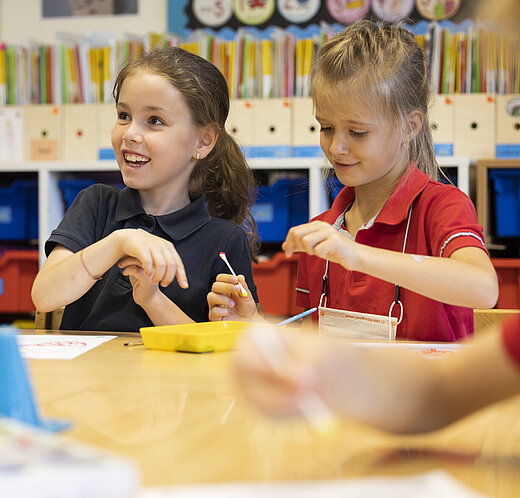
Interdisciplinary learning combines different subject areas and enables children to view topics from multiple perspectives. In primary school, this is often realised through interdisciplinary projects where subjects such as mathematics, science and art are linked. This holistic approach helps children to better understand connections and retain knowledge more effectively. They learn not only subject-specific content but also develop creative thinking, problem-solving skills and teamwork. Furthermore, interdisciplinary learning fosters curiosity and motivation by making lessons practical and varied.
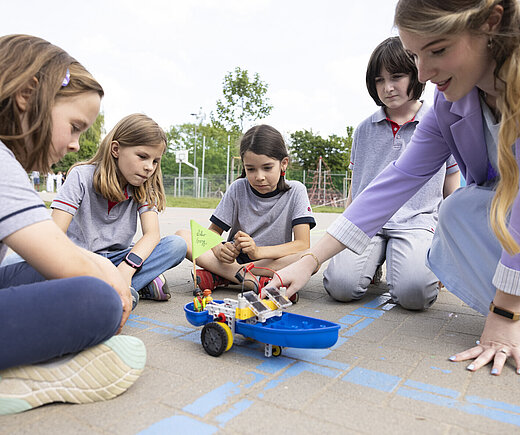
No, but they should be fluent in at least one of our two languages of instruction: German or English.
Entdecke Phorms – Discover Phorms!
Learning begins with discovery. Join other curious children to explore what school is all about and meet your first teachers – all in a real classroom!
After saying goodbye to your parents, you'll first have the chance to explore the classroom and play with the other children. Then we'll start the day together with a welcome circle and enjoy a small breakfast to give us energy for what's to come.
Refreshed and ready to go, we'll dive into a range of fun activities – crafting, solving puzzles and playing games. We’ll read stories in both German and English, and of course, we’ll have lots of fun with some movement games too!
While you're busy playing and exploring, your parents will get some more information about the school – and they’ll be excited to hear all about your morning.
We’re looking forward to seeing you!
We observe the children according to our admission criteria such as language skills, age-appropriate development and social behaviour. This is done playfully to ensure the children enjoy their time with us without any pressure to perform. No preparation is necessary. However, we recommend visiting one of our open days with your child beforehand so they can get to know the campus and feel more comfortable in the new environment.
Our teaching follows the Hessian curriculum, so a transfer in either direction is possible at any time, depending on the child’s language skills.
Many of our families have been rooted in Frankfurt and the surrounding area for a long time. However, plans can change, and people may move away for work.
Our meals are balanced, regional and certified organic. Every day, trained chefs from our catering partner FPS prepare fresh meals in our school kitchen. Children can choose between two dishes – one of which is always vegetarian – and help themselves to a variety of fresh raw vegetables at the salad bar. Fresh water is available throughout the day. The menu typically includes fish once a week and organic poultry or beef twice a week. As shared meals are an important part of our school culture, For us, eating together is part of building a community. We encourage good table manners and respectful behaviour. After lunch, children have plenty of time to play and move around.
While we offer individualised support within the framework of our school concept. If you have questions about your child’s individual requirements, please contact our Admissions Team for a personal consultation.
Do you have questions about our school, our kindergarten or the administration process? We will be delighted to assist you with any queries.
